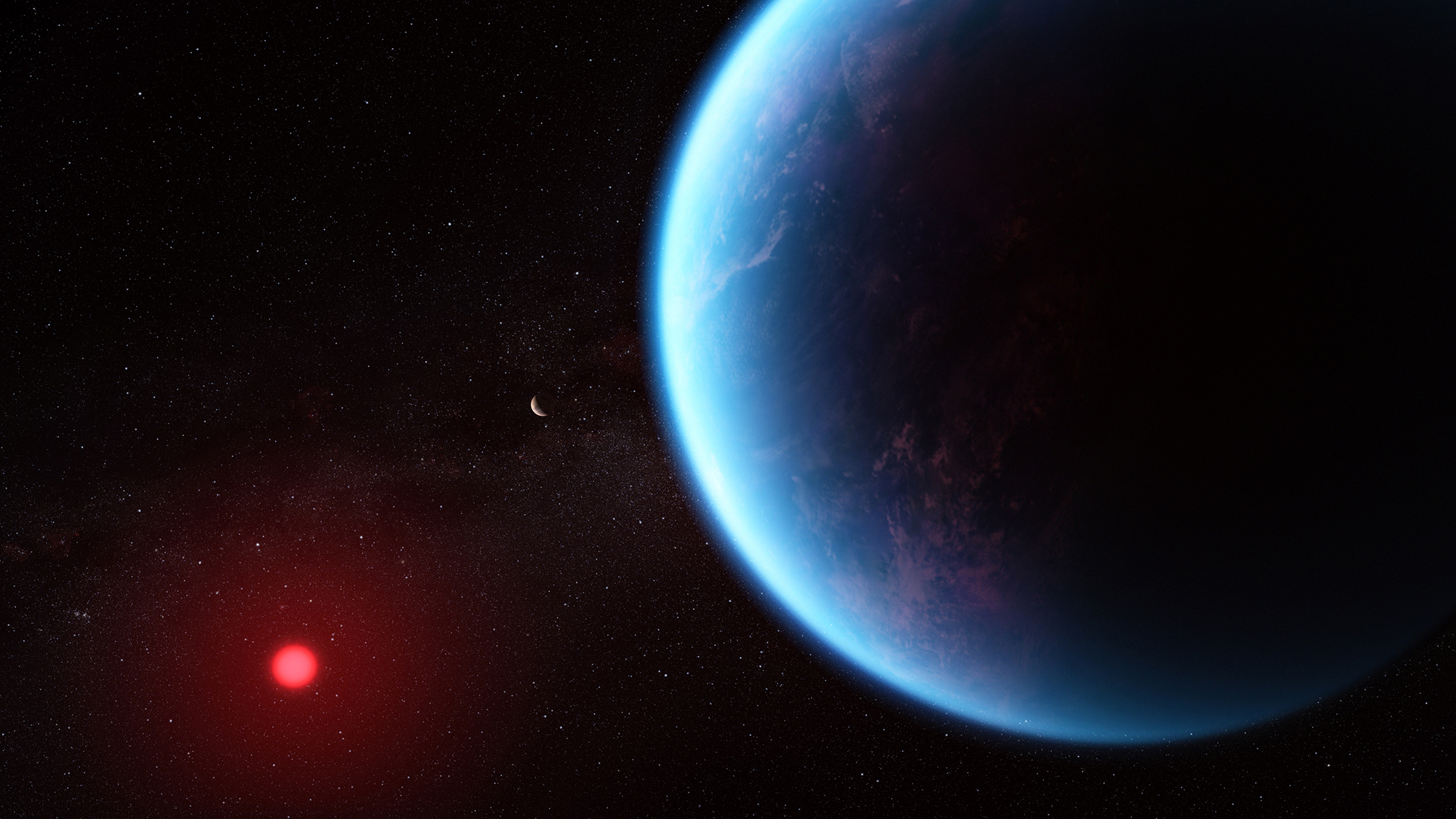Scientists find hint of alien life on distant world
NASA's James Webb Space Telescope has detected a possible signature of life on planet K2-18b


A free daily email with the biggest news stories of the day – and the best features from TheWeek.com
You are now subscribed
Your newsletter sign-up was successful
What happened
Astrophysicists reported Wednesday they had found significant evidence that life may exist on a planet called K2-18b, some 124 light years away. The report, published in The Astrophysical Journal Letters, said NASA's James Webb Space Telescope had detected large amounts of dimethyl sulfide and/or dimethyl disulfide — gasses that on Earth are only created by living organisms — in the exoplanet's atmosphere.
Who said what
Study leader Nikku Madhusudhan, from Cambridge University's Institute of Astronomy, said the new findings point to K2-18b, discovered in 2015, being a "hycean world" covered by a deep ocean "teeming with life." The team didn't prove the existence of alien life, but "this is a revolutionary moment," he said at a news conference. "It's the first time humanity has seen potential biosignatures on a habitable planet."
Other scientists urged caution. A "molecule glimpsed in the air of a planet 729 trillion miles away is a thin reed upon which to rest what would be the historic discovery of alien life," The Washington Post said.
The Week
Escape your echo chamber. Get the facts behind the news, plus analysis from multiple perspectives.

Sign up for The Week's Free Newsletters
From our morning news briefing to a weekly Good News Newsletter, get the best of The Week delivered directly to your inbox.
From our morning news briefing to a weekly Good News Newsletter, get the best of The Week delivered directly to your inbox.
What next?
The "rich data from K2-18b make it a tantalizing world," and "I look forward to seeing additional, independent work on the data analysis starting as soon as next week," said planetary scientist Christopher Glein of the Southwest Research Institute in Texas, per The New York Times. But "unless we see E.T. waving at us, it's not going to be a smoking gun."
A free daily email with the biggest news stories of the day – and the best features from TheWeek.com
Peter has worked as a news and culture writer and editor at The Week since the site's launch in 2008. He covers politics, world affairs, religion and cultural currents. His journalism career began as a copy editor at a financial newswire and has included editorial positions at The New York Times Magazine, Facts on File, and Oregon State University.
-
 How the FCC’s ‘equal time’ rule works
How the FCC’s ‘equal time’ rule worksIn the Spotlight The law is at the heart of the Colbert-CBS conflict
-
 What is the endgame in the DHS shutdown?
What is the endgame in the DHS shutdown?Today’s Big Question Democrats want to rein in ICE’s immigration crackdown
-
 ‘Poor time management isn’t just an inconvenience’
‘Poor time management isn’t just an inconvenience’Instant Opinion Opinion, comment and editorials of the day
-
 How roadkill is a surprising boon to scientific research
How roadkill is a surprising boon to scientific researchUnder the radar We can learn from animals without trapping and capturing them
-
 NASA’s lunar rocket is surrounded by safety concerns
NASA’s lunar rocket is surrounded by safety concernsThe Explainer The agency hopes to launch a new mission to the moon in the coming months
-
 The world’s oldest rock art paints a picture of human migration
The world’s oldest rock art paints a picture of human migrationUnder the Radar The art is believed to be over 67,000 years old
-
 Moon dust has earthly elements thanks to a magnetic bridge
Moon dust has earthly elements thanks to a magnetic bridgeUnder the radar The substances could help supply a lunar base
-
 The ocean is getting more acidic — and harming sharks’ teeth
The ocean is getting more acidic — and harming sharks’ teethUnder the Radar ‘There is a corrosion effect on sharks’ teeth,’ the study’s author said
-
 Cows can use tools, scientists report
Cows can use tools, scientists reportSpeed Read The discovery builds on Jane Goodall’s research from the 1960s
-
 The Iberian Peninsula is rotating clockwise
The Iberian Peninsula is rotating clockwiseUnder the radar We won’t feel it in our lifetime
-
 NASA discovered ‘resilient’ microbes in its cleanrooms
NASA discovered ‘resilient’ microbes in its cleanroomsUnder the radar The bacteria could contaminate space
